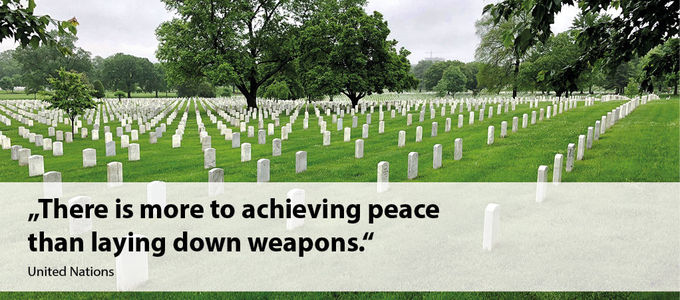
Even peaceful times are at times deceiving. An imposed peace will not last very long: only if it comes from the heart will peace be serious and lasting. Following are some reflections on the International Day of Peace.
Sometimes, when people talk about peace, all they really mean is a truce or ceasefire. But an armistice is only the first step in arriving at a reliable peace accord. Most people are already familiar with this from their own interrelationships with one another. Tempers are still high, there is still disagreement, and there is still internal rancour and resentment. How is a deep, serious peace supposed to be built upon this? If these conditions prevail, agreements are often nothing more than a piece of paper.
Peace, freedom, and justice belong together
Peace is more than a mere ceasefire or the absence of war. This is also the sentiment underlying the events sponsored by the United Nations (UN) this year: “There is more to achieving peace than laying down weapons. True peace requires standing up for the human rights of all the world’s people. That is why this year’s theme for the International Day of Peace is: ‘The Right to Peace’” — the Universal Declaration of Human Rights has turned 70. At the heart of this Universal Declaration is the human right to freedom, peace, and justice. It is the most frequently translated document in the world, and is now available in 500 languages. Have these basic rules proven themselves?
What is certain is that peace must also prove itself in noisy, restless, and unfair times. A covenant of peace must persevere even if one party fails at times, or if collectively established goals are not achieved. Peace is intended to create security, and it signifies nothing less than protection and friendship. There is no room for violence or hatred here. Only those who master disputes and conflicts with empathy, without going out of their way to avoid them, work actively for peace. It is precisely this ability to empathise with the mindset of others that is the beginning of a fundamentally peaceful coexistence.
Peace is spiritual health
This applies all the more for Christians, since preserving peace is a mandate from Jesus. The term ‘shalom’ refers to the salvation of the soul, the complete—and above all, internal—health of the believer. The devout desire peace with God, and are prepared to pay a price for the peace of their own souls, namely by making their peace with others. Christians are to make peace, and at the same time, preserve this peace. When this is the case, the words that Paul writes in his letter to the Corinthians will come to bear: “The God of love and peace will be with you.” For believing Christians it is clear that the Holy Spirit is a Spirit of peace, and that He helps to overcome tensions, divisions, and strife. To act in the mind and spirit of Jesus implies making peace. “Blessed are the peacemakers, for they shall be called sons of God” (Matthew 5: 9).
Background
On 21 September, humanity celebrates its International Day of Peace. The first event of this kind was celebrated in 1981. In 2004, the World Council of Churches (WCC) also began lending its weight to the event, calling upon all Christians to pray for peace in the world. The international New Apostolic Church has also been part of this effort since 2005: in its midweek divine services around the world, worshippers join in a special prayer for this peace. Thus the 21st of September is both a day of peace and a day of prayer.




